History
Ruah has been a leading voice for change for more than 60 years.
The service was founded in 1959. It was the year Perth’s iconic Narrows Bridge opened and our then sleepy city teetered on the brink of an iron ore boom. Along with the benefits of wealth and growth, came a new wave of homeless and destitute people who flocked to the city in search of help.
1959
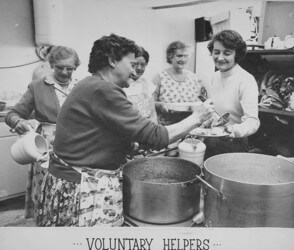
The Daughters of Charity soup kitchen opens its doors in Northbridge. On its first day, it served 29 nourishing meals to men sleeping rough on Perth streets.
Late 1950s
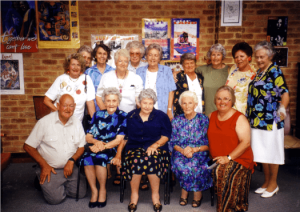
The first Daughters of Charity opportunity shop opens in Oxford Street, Leederville.
1961
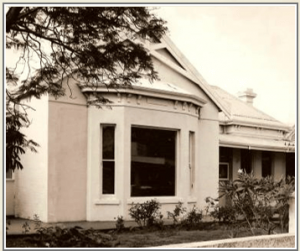
The Daughters of Charity open WA’s first women’s refuge.
1963
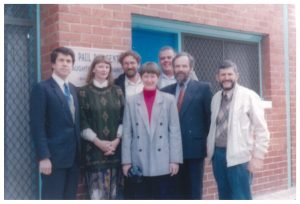
The soup kitchen relocates to larger premises named the De Paul Centre after Daughters of Charity founder St Vincent de Paul.
1966
The women’s refuge moves to a purpose built facility in Highgate – with AveMaria House officially opened by former WA Premier David Brand, in October 1966.It was later renamedHarmony Place.
1988
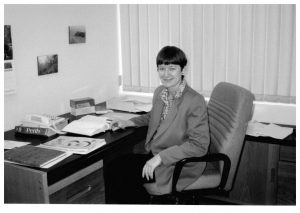
Sheryl Carmody is appointed as the first social worker – a major step in the ongoing development of Ruah’s professional services.
1993
Community-based support services for people living with mental illness are piloted in Perth and Fremantle.
1994
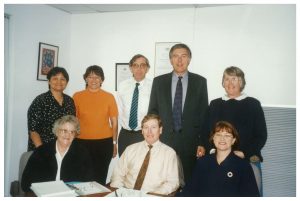
40A significant milestone is reached when the Daughters of Charity form a public company limited by guarantee, Daughters of Charity Services WA, and appoint its first Board of Directors.
1995
The Daughters of Charity Services WA partner with a range of healthcare providers to establish the Early Episode Psychosis Program.The same year, they partner with Derbarl Yerrigan Health Service to provide mental health support for Aboriginal people.
1996
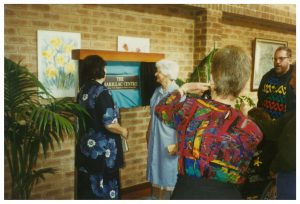
The De Paul Centre is renamed, The Marillac Centre commemorating the first Daughter of Charity, Louise de Marillac.
1996
The Daughters of Charity Services WA appoints its first CEO, John Gherardi.
2001
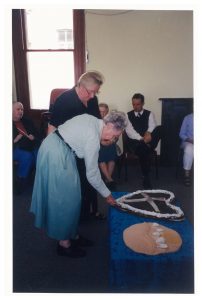
The Daughters of Charity Services WA is renamed Ruah Community Services – a name inspired by the ancient Hebrew word meaning ‘wind’, ‘breath’, and ‘spirit of life’.
2004
Recognising employment as an important enabler, Ruah establishes Ruah Workright – a specialist job placement agency. The Big Issue Magazine is brought to Perth, giving people the opportunity to earn an income and break the poverty cycle.
2007
Francis Lynch takes over as CEO and the transition to be an independent entity under both Civil and Canon Law is complete.The Marillac Centre is renamed the Ruah Centre and the Anawim Aboriginal Women's refuge is handed to Ruah by the Catholic Church.
2014
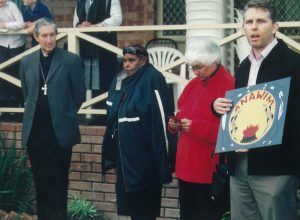
The Anawim Aboriginal Women’s Refuge is renamed the Kambarang Centre.
2016
Ruah takes the lead in the 50 Lives 50 Homes initiative – a powerful collaboration of over 50 services from 35 organisations which has housed more than 230 of Perth’s most vulnerable rough sleepers.
2016
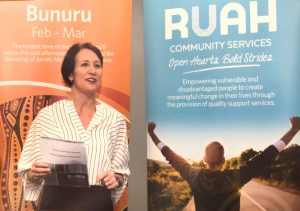
Ruah appoints its current CEO, Debra Zanella.
2017-18
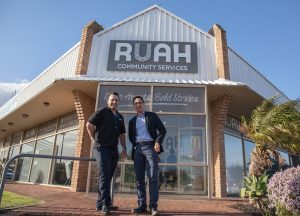
A period of expansion sees Ruah open new offices in Fremantle, Subiaco, Rockingham and Cockburn.
2018
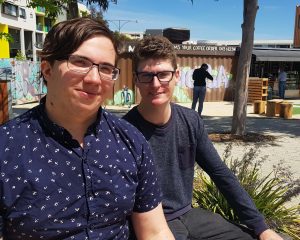
Ruah opens the EPY Centre to provide personalised functional recovery support to young people aged 12 to 25 years and their families.
2018
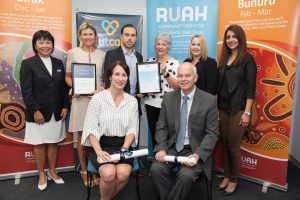
Ruah achieves accreditation from both National Standards for Health Services and the National Safety and Quality Health Service, making it one of just two community service organisations in WA to gain accreditation against two sets of national quality standards.
2019
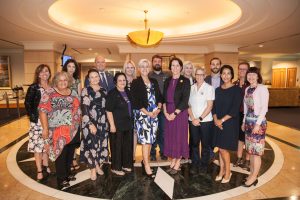
Ruah hosts the first Roundtable to End Family and Domestic Violence, joined by an alliance of 17 leading organisations and peak bodies committed to ending family and domestic violence.
2019
Ruah celebrates its 60th anniversary. Today its committed team continues the powerful tradition and spirit first established in 1959. Open your heart Embolden your stride.
2019
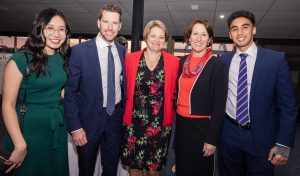
Ruah and the Mental Health Law Centre merge.
2020
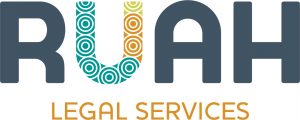
Ruah and MHLC expand the integrated support they offer into areas of care and protection,housing and homelessness and family and domestic violence - and bring those services together under one umbrella banner - Ruah Legal Services.
2020
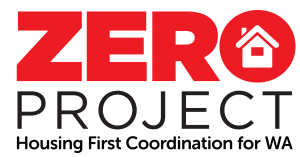
Ruah Community Services is appointed as the Housing First Coordinator for WA and launches the Zero Project – Housing First Coordination for WA as part of the State Government’s Housing First Homelessness Initiative.
2020
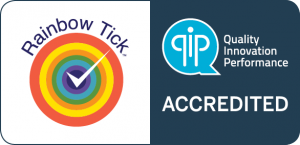
In December 2020, Ruah achieves Rainbow Tick Accreditation, a national accreditation that recognises our commitment to providing safe and inclusive services for the LGBTI+ community.
Use the arrow keys on your keyboard for quick navigation
Pioneering services
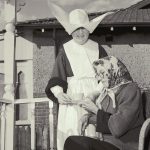 Four brave women, driven by their religious faith, arrived in Western Australia to work with the poor in Northbridge. They were known as the “aeroplane nuns” because of their elaborate white headgear, and belonged to the Daughters of Charity, a Catholic order of nuns established by St Vincent de Paul who worked with poor people on the streets of Europe 300 years ago.
Four brave women, driven by their religious faith, arrived in Western Australia to work with the poor in Northbridge. They were known as the “aeroplane nuns” because of their elaborate white headgear, and belonged to the Daughters of Charity, a Catholic order of nuns established by St Vincent de Paul who worked with poor people on the streets of Europe 300 years ago.
The Daughters of Charity were resilient and resourceful, setting up Perth’s first soup kitchen, first women’s shelter and first Aboriginal women’s refuge. They saw a need and were driven to provide practical help for the most vulnerable and disadvantaged people around them. At the time, social services were in their infancy and government funding was almost non-existent.
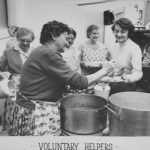 By the 1990s, the foundation of Ruah as a modern, professional organisation was taking shape. The Sisters established a public company – Daughters of Charity Services WA Ltd – and began handing over their operations to a lay management team.
By the 1990s, the foundation of Ruah as a modern, professional organisation was taking shape. The Sisters established a public company – Daughters of Charity Services WA Ltd – and began handing over their operations to a lay management team.
Professional staff were employed to develop an integrated therapeutic model to tackle the complex problems of people in need and their families. Capacity-building projects were initiated, from recreation to support for the children of parents with mental illness, and research was conducted to evaluate and inform professional practice.
First in mental health
Ruah pioneered community-based mental health services in WA and mental health and wellness is now the biggest part of our operation.
A partnership with the Derbarl Yerrigan Health Service was set up to provide mental health support for Aboriginal people, and collaborations with government health and other agencies pioneered a raft of community-based mental health and wellness programs.
The modern Ruah
In 2009, after 50 years in Perth, the Daughters of Charity officially relinquished control of the not-for-profit company and the organisation changed its name to Ruah Community Services. This severed formal ties with the Catholic Church and completed our transition an independent entity.
The De Paul Centre, which started out as the original soup kitchen, was renamed the Ruah Centre (now called Ruah Engagement Hub). It launched a progressive new model to fill emerging gaps in services for people experiencing homelessness including a new generation of young people struggling with drug addiction.
The long-established women’s refuge at Ave Maria House, now Harmony Place, was brought under the new corporate umbrella, along with Anawim, the first shelter for Aboriginal women in WA, now Kambarang Place.
Building on our legacy
Today, Ruah is an independent, not-for-profit organisation lead by a prominent Board and Executive. We are moving forward with open hearts and bold strides … but we never lose sight of the pioneering and courageous work our founders began. Social, economic, political and cultural circumstances change, but what has lived on from decade-to-decade is our drive to make a difference for people who are vulnerable, disadvantaged and discriminated against.
